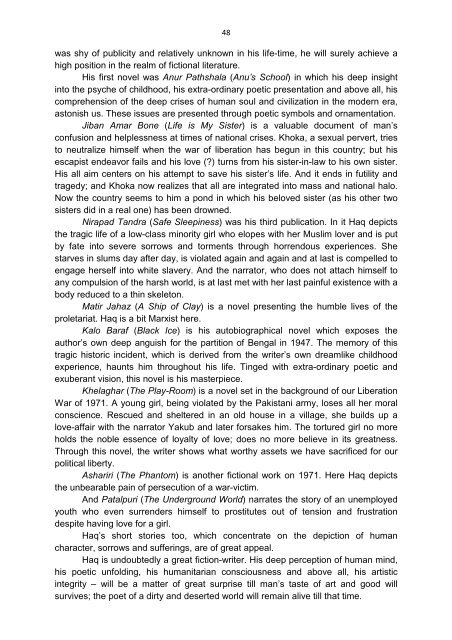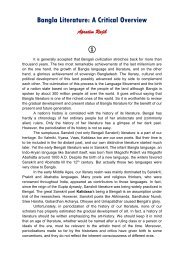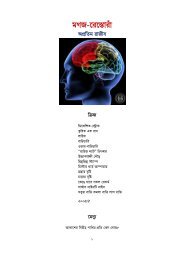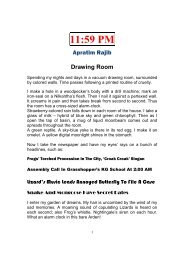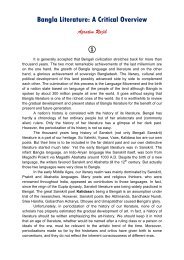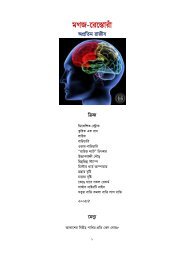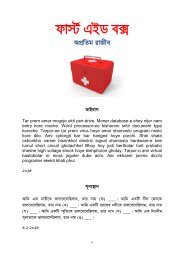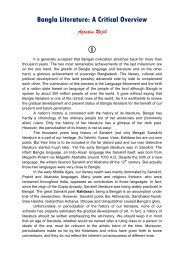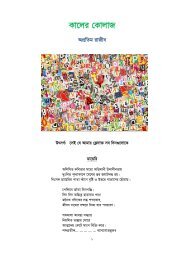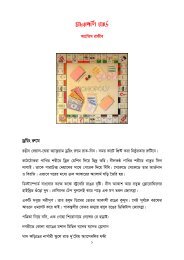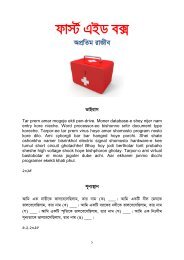BLiterature-Apratim
Create successful ePaper yourself
Turn your PDF publications into a flip-book with our unique Google optimized e-Paper software.
48<br />
was shy of publicity and relatively unknown in his life-time, he will surely achieve a<br />
high position in the realm of fictional literature.<br />
His first novel was Anur Pathshala (Anu’s School) in which his deep insight<br />
into the psyche of childhood, his extra-ordinary poetic presentation and above all, his<br />
comprehension of the deep crises of human soul and civilization in the modern era,<br />
astonish us. These issues are presented through poetic symbols and ornamentation.<br />
Jiban Amar Bone (Life is My Sister) is a valuable document of man’s<br />
confusion and helplessness at times of national crises. Khoka, a sexual pervert, tries<br />
to neutralize himself when the war of liberation has begun in this country; but his<br />
escapist endeavor fails and his love (?) turns from his sister-in-law to his own sister.<br />
His all aim centers on his attempt to save his sister’s life. And it ends in futility and<br />
tragedy; and Khoka now realizes that all are integrated into mass and national halo.<br />
Now the country seems to him a pond in which his beloved sister (as his other two<br />
sisters did in a real one) has been drowned.<br />
Nirapad Tandra (Safe Sleepiness) was his third publication. In it Haq depicts<br />
the tragic life of a low-class minority girl who elopes with her Muslim lover and is put<br />
by fate into severe sorrows and torments through horrendous experiences. She<br />
starves in slums day after day, is violated again and again and at last is compelled to<br />
engage herself into white slavery. And the narrator, who does not attach himself to<br />
any compulsion of the harsh world, is at last met with her last painful existence with a<br />
body reduced to a thin skeleton.<br />
Matir Jahaz (A Ship of Clay) is a novel presenting the humble lives of the<br />
proletariat. Haq is a bit Marxist here.<br />
Kalo Baraf (Black Ice) is his autobiographical novel which exposes the<br />
author’s own deep anguish for the partition of Bengal in 1947. The memory of this<br />
tragic historic incident, which is derived from the writer’s own dreamlike childhood<br />
experience, haunts him throughout his life. Tinged with extra-ordinary poetic and<br />
exuberant vision, this novel is his masterpiece.<br />
Khelaghar (The Play-Room) is a novel set in the background of our Liberation<br />
War of 1971. A young girl, being violated by the Pakistani army, loses all her moral<br />
conscience. Rescued and sheltered in an old house in a village, she builds up a<br />
love-affair with the narrator Yakub and later forsakes him. The tortured girl no more<br />
holds the noble essence of loyalty of love; does no more believe in its greatness.<br />
Through this novel, the writer shows what worthy assets we have sacrificed for our<br />
political liberty.<br />
Ashariri (The Phantom) is another fictional work on 1971. Here Haq depicts<br />
the unbearable pain of persecution of a war-victim.<br />
And Patalpuri (The Underground World) narrates the story of an unemployed<br />
youth who even surrenders himself to prostitutes out of tension and frustration<br />
despite having love for a girl.<br />
Haq’s short stories too, which concentrate on the depiction of human<br />
character, sorrows and sufferings, are of great appeal.<br />
Haq is undoubtedly a great fiction-writer. His deep perception of human mind,<br />
his poetic unfolding, his humanitarian consciousness and above all, his artistic<br />
integrity – will be a matter of great surprise till man’s taste of art and good will<br />
survives; the poet of a dirty and deserted world will remain alive till that time.


